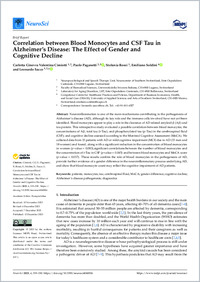Correlation between blood monocytes and CSF tau in Alzheimer’s disease : the effect of gender and cognitive decline
- Cimiotti, Carlotta Ginevra Valentina Neuropsychological and Speech Therapy Unit, Neurocenter of Southern Switzerland, Ente Ospedaliero Cantonale, Lugano, Switzerland - Faculty of Biomedical Sciences, Università della Svizzera italiana, Switzerland
- Paganetti, Paolo ORCID Faculty of Biomedical Sciences, Università della Svizzera italiana, Switzerland - Laboratory for Aging Disorders, LRT, Ente Ospedaliero Cantonale, Bellinzona, Switzerland
- Rossi, Stefania Neuropsychological and Speech Therapy Unit, Neurocenter of Southern Switzerland, Ente Ospedaliero Cantonale, Lugano, Switzerland
- Soldini, Emiliano Competence Centre for Healthcare Practices and Policies, Department of Business Economics, Health, and Social Care (DEASS), University of Applied Sciences and Arts of Southern Switzerland, Manno, Switzerland
- Sacco, Leonardo ORCID Neuropsychological and Speech Therapy Unit, Neurocenter of Southern Switzerland, Ente Ospedaliero Cantonale, Lugano, Switzerland - Faculty of Biomedical Sciences, Università della Svizzera italiana, Switzerland
- 2023
Published in:
- NeuroSci. - 2023, vol. 4, no. 4, p. 319-330
Patients
Monocytes
Tau
Cerebrospinal fluid
MoCA
Gender difference
Cognitive decline
Alzheimer’s disease pathogenesis
Diagnostics
English
Neuroinflammation is one of the main mechanisms contributing to the pathogenesis of Alzheimer’s disease (AD), although its key role and the immune cells involved have not yet been identified. Blood monocytes appear to play a role in the clearance of AD-related amyloid-β (Aβ) and tau protein. This retrospective study evaluated a possible correlation between blood monocytes; the concentrations of Aβ, total tau (t-Tau), and phosphorylated tau (p-Tau) in the cerebrospinal fluid (CSF); and cognitive decline assessed according to the Montreal Cognitive Assessment (MoCA). We collected data from 33 patients with AD or mild cognitive impairment (MCI) due to AD (15 men and 18 women) and found, along with a significant reduction in the concentration of blood monocytes in women (p-value = 0.083), significant correlations between the number of blood monocytes and the concentration of t-Tau in CSF (p-value = 0.045) and between blood monocytes and MoCA score (p-value = 0.037). These results confirm the role of blood monocytes in the pathogenesis of AD, provide further evidence of a gender difference in the neuroinflammatory process underlying AD, and show that blood monocyte count may reflect the cognitive impairment of AD patients.
- Collections
- Language
-
- English
- Classification
- Medicine
- License
- Open access status
- gold
- Identifiers
-
- DOI 10.3390/neurosci4040026
- ARK ark:/12658/srd1332080
- Persistent URL
- https://n2t.net/ark:/12658/srd1332080
Statistics
Document views: 66
File downloads:
- Sacco_2023_MDPI_neurosci_Correlation between Blood Monocytes: 27
